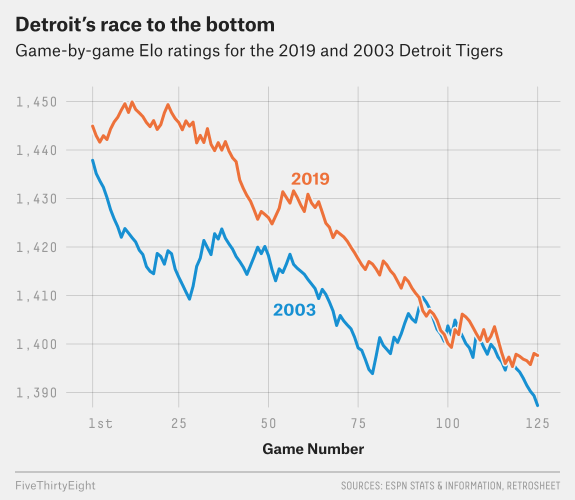


The 2019 version of the Detroit Tigers is unearthing some pretty painful memories for fans who have been reminiscing of that 2003 squad that came one loss short of tying the MLB record for losses in a season.
Now this year’s version of the Tigers probably won’t match their 2003 mark of 119 loses since they’ll need to go 3-30 over their final 33 games. However, there’s speculation out there as to whether the 2019 Tigers are actually worse than that 03′ squad.
Some of that speculation comes straight from FiveThirtyEight by way of the Elo calculation:
The FiveThirtyEight projection model thinks the 2019 Tigers will fall a bit short of the 2003 version’s loss total, predicting 111 defeats for Detroit by season’s end. But in terms of other measures, such as our Elo ratings, these Tigers are astonishingly close to their abysmal predecessors. Through 125 games, the Tigers have an Elo of 1398, which not only means Detroit has wrested the crown of “Worst Team in Baseball” away from the Baltimore Orioles — a title that once seemed impossible for the O’s to lose — but it also makes these Tigers just the 14th team ever to have an Elo under 1400 at this stage of a season. Their Elo is currently within striking distance of the 2003 team, which had a 1387 rating at this point in the schedule, and the current Tigers were slightly ahead of their ancestors in the race to baseball’s bottom as recently as eight games ago:


What’s Elo though? Here’s the explanation:
What’s Elo, you ask? Named after the Hungarian-American chess master (and power-ratings pioneer) Arpad Elo, Elo is a simple way to rate competitors that can be tuned and customized endlessly to incorporate available data. For our purposes, each MLB team carries a rating that estimates its current skill level. (The average is about 1500.) After every game is played, the winning team gains some rating points while the losing team loses the same number of points, based on the chances our model gave each team to win the game beforehand (and the margin of victory). For example, a win by a big underdog results in a bigger exchange of points than a win by a favorite — and the larger the margin of victory, the larger the exchange.
Despite the Tigers originally falling short of that 120
As far as this year’s team goes, I guess we’ll have to make that final evaluation when the season has finally come to an end.










